Myanmar's Projects
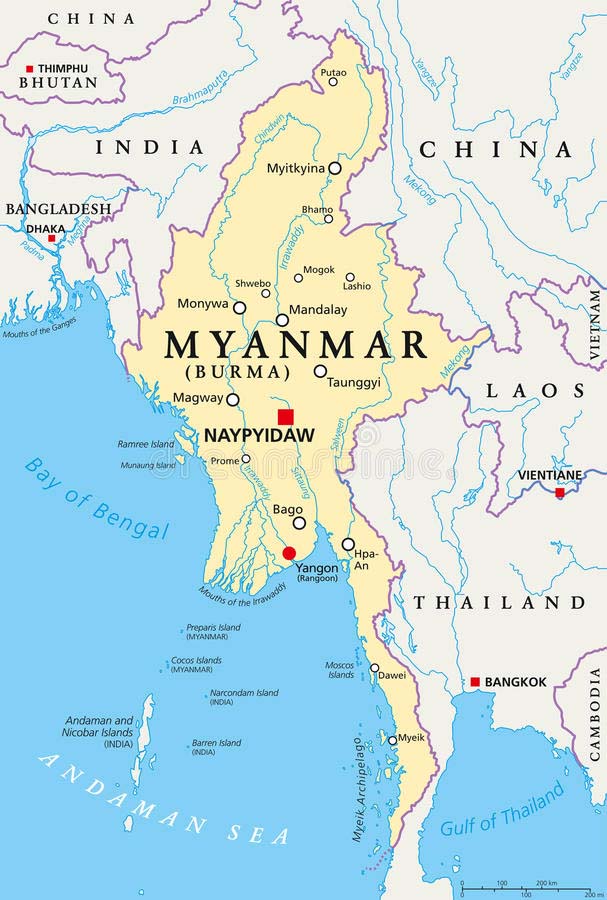
Integrated Health Community in marginal regions of Myanmar 158/MM21
DONOR
FAI (Fondation Assistance International)

Durata: 30 mesi
Aids, nutrition and hygiene in the dry zone and in the Nagaland
The intervention includes two distinct project areas where specific components can be created that meet the most felted needs of the population:
1. Dry Zone of Myanmar, in the Magway Region and in particular in the cities of Magway, Myothit and Natmauk (nutrition and hygiene)
2. Naga Self-Administered Zone (Burmese Nagaland), and in particular the city of Lahe. It is an autonomous region, extremely isolated, among the poorest and most problematic in the country (exclusively hygiene).
The project is essentially based on behavior modification techniques, with the aim of improving attitudes and practices related to nutrition and hygiene in two remote areas of Myanmar: the rural area of the Dry Zone and the border area formed by the Burmese Nagaland .
The heart of the project will be in the Dry Zone, where, through events, public discussions on health issues, creation of information material, and further activities, the knowledge and behaviors related to good nutritional and hygiene practices will be improved, especially for children, in 20 villages.
In the Nagaland area, instead, we will focus exclusively on hygienic practices, in order to have a point of contact with isolated communities that are not used to having external contacts, in 20 other villages.
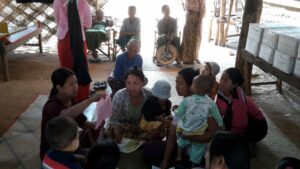
The awareness campaigns will benefit 6,000 people in the Magway Region, and 2,500 people in Nagaland. At least 1,200 malnourished children will undergo a 3-month rehabilitation therapy.
General Objective: To contribute to the improvement of basic health conditions in Myanmar’s remote communities and in particular to the well-being of the most marginal sectors of these communities
Specific Objective: The project aims to improve community health, particularly in childhood, through an integrated strategy aimed at counteracting the major problems encountered in the project areas: nutrition and hygiene.
Expected results:
These objectives will be reached through the achievement of two expected results, as follows:
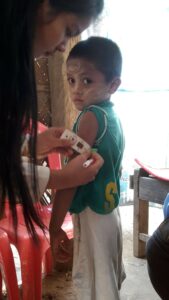
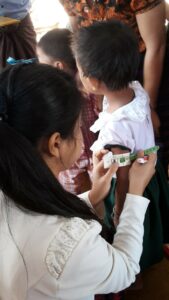
R1. The rate of malnutrition (and in particular severe or moderate malnutrition) has been reduced, particularly among children (from 6 to 59 months of age) and between pregnant women and those who are (being bedded out) being settled in the Magway Region.
R2. Improved basic hygiene conditions in 40 villages: 20 in the Magway region and 20 in the autonomous region of Burmese Nagaland (Lahe Township).
As for the Magway Region, the expected direct beneficiaries are 6,000 people for the awareness campaign, plus 1,200 malnourished children who will undergo a 3-month rehabilitation therapy.
In Nagaland the beneficiaries of the awareness campaign are estimated as 2,500 people.
Indirect beneficiaries can be estimated as the entire population of the 40 villages affected by the project, or about 20,000 people in the Dry Zone, and about 4,000 people in Nagaland.
Duration of the project and period of performance: 2 years – from July 2018 to June 2020
Total cost: € 318,300
Realized thanks to the contribution of the Fondation Assistance Internationale – FAI for Euro 259.900
Optimize the supply chain and favor the associated economies in the state of Southern Chin” (n°160/MM23)
Donor: AICS
Capofila: ASIA
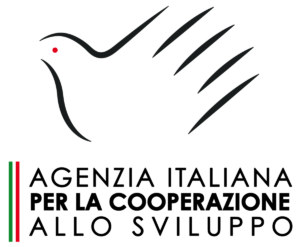

Duration: 36 months – starting November 2019
Description:
The project aims at the sustainable development of the coffee supply chain in Myanmar, a country where the economic potential of this resource is not fully exploited. The proposal stems from a long collaboration of partners locally and in Italy and from more field research that analyzed the local context, highlighting its fragility and potential. Despite the fact that the natural green coffee of the Chin region has recently been evaluated, through cupping tests in Italy, as an excellent coffee in terms of quality, the opportunities associated with its sale on the local and international market are still very limited and families engaged in its production fail to obtain significant gains. Furthermore, while growing coffee with a semi-natural approach that enhances its quality and environmental sustainability, the co-farmers do not use adequate processing and conservation techniques, compromising the quality of the final product and causing a continuous loss of forest area in practicing agriculture. itinerant. For these reasons, the project intends to increase the quantity and quality of production and of the final product, increase job and income opportunities for co-farmers, strengthen the coffee supply chain and micro-entrepreneurial activities linked to complementary supply chains (forest products non-woody products obtained from shade plants), and aim for a conscious and sustainable use of resources. Strengthened by the involvement of a local partner, operating for years in the identified context, the two Italian partners therefore aim to implement activities that will lead not only to the development of the supply chain but also to the creation of market networks, focusing particularly on categories of disadvantaged beneficiaries, in especially women and young people, and on innovative activities that can fit perfectly into the local context in order to create a sustainable system even once the project is completed.
Beneficiaries: 600 coffee producers and their families, 80 landless families
Within this project, the activities borne by the PC are co-financed thanks to the contribution of the Otto per Mille Office of the Waldensian church.
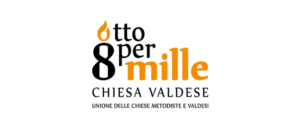
The financed activities are aimed at increasing the commercial value of Chin coffee on the national and international market and increasing the related sales opportunities & strengthening micro-entrepreneurial activities linked to complementary coffee supply chains.
Specifically, the activities will be:
A.1.1 Implementation of a sector study on the national and international market of Chin coffee: mapping and identification of commercial partners in the country and abroad.
OUTPUT
1 sector study
1 list of Burmese operators identified as a network for future sales
A 1.2 Organization of 2 seminars to present the output of the sector study in which the representatives of the institutions and coffee producers participate.
OUTPUT
2 seminars to present the market analysis, in the districts of Mindat and Kanpetlet, with an expected participation of 600 producers
A1.3 Training of 4 technicians from the Mindat District on national market, marketing and commercialization opportunities
OUTPUT
4 trained technicians
A2.1 Selection and training of 250 coffee producers on the production and marketing of agricultural products deriving from supply chains complementary to coffee.
OUTPUT
# 250 trained producers
A2.2 Organization of 2 events for the presentation and promotion of the selected complementary products
OUTPUT
# Mapping of operators interested in products from complementary coffee supply chains
# at least 24 professional traders of the complementary products identified
# 2 events
# 2 purchase contracts set up
Food assistance for children with Moderate Acute Malnutrition (MAM) in the townships of Minbu and Natmauk
DONOR: WFP

DURATION: JANUARY-DECEMBER 2021
The overall objective of the project is to support the reduction of malnutrition in the Magway region, for vulnerable groups, such as children and pregnant and breastfeeding women.
The project will directly contribute to the WFP Nutrition Strategy: Children under 5 and others
nutritionally vulnerable groups in Myanmar improving nutrition in line with national targets by 2022.
The effectiveness of the intervention will be measured by several indicators:
Percentage of eligible population participating in the program
Percentage of the target population participating in an adequate number of super grain distributions
Treatment of MAM – Recovery rate
Treatment of MAM – Mortality rate
Treatment of MAM – Non-response rate
Treatment of MAM – Default rate
The expected results are:
Malnourished girls and children under the age of 5 receive a complete nutritional package for
treat acute malnutrition
920 women and girls and 600 boys and girls receiving food / money / commodity vouchers / capacity building training
33,120 tons of food distributed
22 Number of women, men, boys and girls with disabilities receiving food / cash / commodity vouchers / capacity-building training
33,120 tons of fortified foods provided
1500 people reached through awareness-raising events on proper nutrition
Health care for mothers and children in rural villages in Magway and Tanintharyi, Myanmar (161 MM24)
The project started in June 2021, lasts one year and is implemented thanks to the generous contribution of the Intesa San Paolo Charity Fund and in partnership with the Turin NGO Medacross.

It aims to improve the health conditions of the most vulnerable groups of the Burmese population (mothers and children) who live in rural villages. The project includes a component of medical attention to ensure a constant lowering of maternal-infant mortality levels in the areas identified.
The health actions provide for the enhancement of maternal and child health services offered at the Rural Health Centers (RHC) and SubRural Health Center (SRHC) through the training of health personnel already assigned and new personnel, the activation of an assistance service obstetrics (Mobile Clinic) and hospital transport from rural areas to hospitals for high-risk pregnancies.
The project will be developed in the Magway region, Nimbu and Natmauk townships (area with the lowest use of maternal health care services) and in the Tanintharyi region, Kawthaung township, where the hospital manages only 28% of all. deliveries occurred in the township, while 17% of expectant mothers cannot count on any medical assistance.
The goal is to ensure complete medical care for more than 2,000 pregnant women living in rural areas, currently very distant from hospitals and excluded from constant clinical check-ups. The main activities focus on future mothers and children living in isolated areas of Myanmar, an extremely fragile target exposed to immune deficiencies and diseases whose consequences have a socio-economic impact on the whole community.
